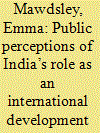|
|
|
Sort Order |
|
|
|
Items / Page
|
|
|
|
|
|
|
| Srl | Item |
| 1 |
ID:
155424


|
|
|
|
|
| Summary/Abstract |
In this article we explore the implications of Brexit for the UK and the EU's development policies and strategic directions, focusing on the former. While it is likely that the operational process of disentangling the UK from the various development institutions of the EU will be relatively straightforward, the choices that lie ahead about whether and how to cooperate thereafter are more complex. Aid and development policy touches on a wide range of interests—security, trade, climate change, migration, gender rights, and so on. We argue that Brexit will accelerate existing trends within UK development policy, notably towards the growing priority of private sector-led economic growth strategies and blended finance tools. There are strong signals that UK aid will be cut, as successive secretaries of state appear unable to persuade a substantial section of the public and media that UK aid and development policy serves UK interests in a variety of ways.
|
|
|
|
|
|
|
|
|
|
|
|
|
|
|
|
| 2 |
ID:
191713


|
|
|
|
|
| Summary/Abstract |
The (re)turn in interest around the concept and projections of civilizational states has followed the recent surge of different authoritarian-populist versions of this discourse, notably in China, India, Russia, Turkey and the United States. In the case of India, the election of Prime Minister Narendra Modi in 2014 supercharged the ideology of Hindutva (the ‘Hinduness’ of the nation) within government, carefully stoked by decades of ground-level social programming and activism by the Rashtriya Swayamsevak Sangh (RSS) and other parts of the Sangh Parivar (the Hindutva family of organizations). Compared to the 1990s and early 2000s, when the Bharatiya Janata Party (BJP) first came to national power espousing the ideas of Hindutva, India is now wealthier (albeit highly unevenly, and with considerable economic weaknesses and fault-lines); and its nationalistic undermining of democratic, liberal norms is deeper, but also more widely mirrored among some western and other southern states. The forces of Hindutva show no signs of abating, and oppositional voices—from secularists, young people, academics, think tanks and human rights organizations, among others—are being openly suppressed. What to external observers may seem a largely benign, even banal, international projection of yoga, traditional medicine and classical dance, and perhaps rather arcane debates over the origins and travels of Aryan peoples, religions and languages, are understood on all sides domestically as existential battles over what constitutes India and being Indian.
|
|
|
|
|
|
|
|
|
|
|
|
|
|
|
|
| 3 |
ID:
154785


|
|
|
|
|
| Summary/Abstract |
This article explores the relationships between (so-called) ‘non-traditional’ development cooperation (NTDC) and political leadership. Using the case studies of Brazil and South Korea, we propose that certain emblematic elements of NTDC discourse and practice can act to influence the relationship with political leaders in particular ways. These are (a) elevated language of affect, (b) interleaving of personal biographies with the developmental trajectories of states, (c) the use of NTDC to legitimise domestic policies and promote domestic political leadership, (d) the prominence of presidential diplomacy and (e) the challenges confronting rapidly expanding domestic development cooperation institutions and systems.
|
|
|
|
|
|
|
|
|
|
|
|
|
|
|
|
| 4 |
ID:
135043


|
|
|
|
|
| Summary/Abstract |
The literature on South–South Development Cooperation (ssdc) has grown exponentially in the past few years. One focus of analysis has been how domestic institutions and agendas shape the approaches to development cooperation of different Southern partners. However, few analysts to date have commented on how the ‘ordinary’ general public of these countries might perceive or assess their country’s role in international development. Through a study based on interviews and media analysis, this paper attempts to tease out the slim evidence currently available on ‘public’ attitudes in India, concentrating, for reasons explained, exclusively on elites and ‘middle classes’. It argues that, while some domestic criticism will certainly accompany the growing visibility of Indian development cooperation, the attractive blend of discursive positioning and material benefits may provide the Indian government with broad support for its growing investment and profile in international development, or at least offset a degree of criticism. At present there appears to be little public discussion about whether and how India’s external role relates to domestic poverty, or the nature of growth and ‘development’ that India is helping to stimulate in partner countries. The paper also discusses ‘boundary making’ with China through the public construction of Indian development cooperation.
|
|
|
|
|
|
|
|
|
|
|
|
|
|
|
|
| 5 |
ID:
160826


|
|
|
|
|
| Summary/Abstract |
A more polycentric global development landscape has emerged over the past decade or so, rupturing the formerly dominant North–South axis of power and knowledge. This can be traced through more diversified development norms, institutions, imaginaries and actors. This paper looks at one trend within this turbulent field: namely, the ways in which ‘Northern’ donors appear to be increasingly adopting some of the narratives and practices associated with ‘Southern’ development partners. This direction of travel stands in sharp contrast to expectations in the early new millennium that the (so‐called) ‘traditional’ donors would ‘socialise’ the ‘rising powers’ to become ‘responsible donors’. After outlining important caveats about using such cardinal terms, the paper explores three aspects of this ‘North’ to ‘South’ movement. These are (i) the stronger and more explicit claim to ‘win‐win’ development ethics and outcomes; (ii) the (re)turn from ‘poverty reduction’ to ‘economic growth’ as the central analytic of development; and (iii) related to both, the explicit and deepening blurring and blending of development finances and agendas with trade and investment.
|
|
|
|
|
|
|
|
|
|
|
|
|
|
|
|
|
|
|
|
|